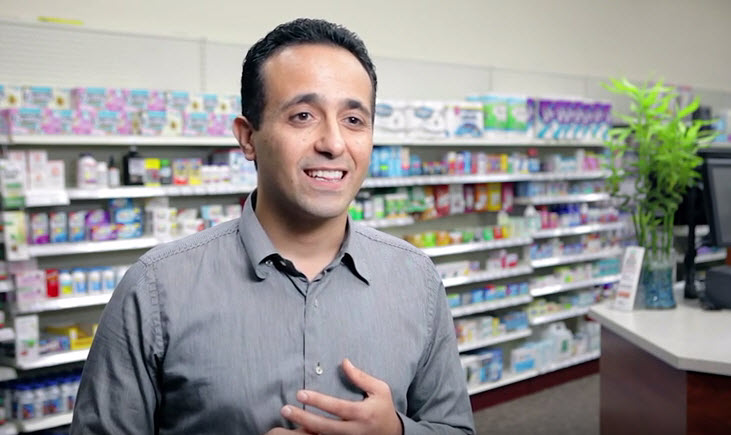Innovative online McGill program offers training for health care professionals
 A growing societal problem
A growing societal problem
Not being properly trained to help patients manage chronic pain issues presents a challenge in health care delivery in Canada. In fact, a 2008 study showed that veterinarians received five times more training in pain management than did medical doctors and three times more than nurses.
This is particularly troubling when you consider that according to a 2010 study, one in five Canadians will suffer from chronic pain. Today, the toll of chronic pain on society results in more in terms of direct health care costs than cancer, heart disease and HIV combined, at an estimated $6 billion per year. An approximate additional $37 billion per year is lost in productivity costs related to job loss and sick days attributed to chronic pain.
As the prevalence of chronic pain increases with age, our aging population signals that this will likely become increasingly problematic moving forward.
Leveraging pain expertise at McGill University
With a strong background in the field at McGill University’s Faculty of Medicine, an innovative online graduate certificate program in chronic pain management was developed by the School of Physical and Occupational Therapy (SPOT) in an effort to better equip health care professionals when it comes to pain management. Launched nearly three years ago, the 15-credit program designed for current health care professionals was made possible through a collaborative initiative between SPOT and the Alan Edwards Centre for Research on Pain.
From the outset, there was great faculty interest in participating in the program. “We have a deep pool of experts in pain management across the McGill campus,” says Dr. Mark Ware, Director of Clinical Research, Alan Edwards Pain Management Unit, McGill University Health Centre, Associate Professor, Departments of Family Medicine and Anesthesia, Faculty of Medicine and co-Chair of the certificate program’s steering committee along with Dr. Isabelle Gelinas, Associate Professor and Director, Graduate Program, SPOT, Faculty of Medicine. Dr. Ware notes that once the curriculum committee established its objectives for the program they identified and reached out to the appropriate experts across the University and invited them to participate, which was received with much interest.
When it came to the make-up of the faculty for the program, one important aspect was that it be inter-professional, much like both the program’s steering committee and the cohort of students, who represent a variety of relevant disciplines, from medicine to nursing to physical and occupational therapy to pharmacology, among others. Throughout the duration of the program, students are encouraged to work in Interprofessional teams and to gain a better understanding of the roles that each plays.
“Any one group of professionals is unlikely to be able to manage a patient’s chronic pain on their own,” says Ware. “Traditionally, health care team members have not been well educated as to what role other team members play in pain management, but when developing a treatment plan for chronic pain it is important to recognize what each set of professionals brings to the table.”
Embracing the learning curve
While the program had little trouble attracting interested faculty members, getting it off the ground was not without a few hiccups, in particular due to the online nature of the program. “There was definitely a learning curve to giving talks online,” notes Ware. “Recording a PowerPoint presentation at home with no live audience, attempting to be engaging and interactive while talking to a screen is a strange concept.”
Online education is an evolving field, and for many faculty members, participating in this course was their first foray into the domain. Continuously updating the program material after initial upload presents a challenge, though the process has been made smoother thanks to the team of faculty and academic associates at SPOT dedicated to supporting and running all aspects of the Program. The decision to offer the program in both English and French, while adding some cost to the design, posed limited challenge to the faculty given that most are bilingual.
From the students’ perspective
With the first cohort of students having graduated, survey results have shown that the participants – who represent every province in Canada as well as the United States, France, India, Asia and Australia – have been pleased with the Program and the number of applicants has increased consistently.
Ware notes that students have been very engaged in the program and the feedback that they have received has been overwhelmingly positive, in particular with the program’s design, which allows students to access material and complete the course in a manner that best fits their schedules. The students themselves have already seen a difference in their professional lives.
“The impact on my practice has been huge,” says Moheb Maalawy, a pharmacist from Mississauga, Ontario in a video posted to YouTube. Maalawy notes that physicians in his area now refer patients dealing with pain to him, and he then sits down with them and discusses options for treatment plans. “It has been really rewarding from that perspective. [The certificate program] has helped me to better understand the whole scope of the process of managing pain.”

Certified for pain management
Already accredited for continuing medical education, the chronic pain certificate program has added a new benefit courtesy of the Canadian Academy of Pain Management (CAPM), a Canadian organization that offers a training course and exam for professionals to certify them in pain management, similar to a board exam in the U.S. As of recently, students completing McGill’s graduate certificate in chronic pain management are eligible to take the CAPM exam and receive their certification, without the need to first take the CAPM course.
For more information on McGill’s Graduate Certificate in Chronic Pain Management, including additional faculty and student testimonials: https://www.mcgill.ca/spot/programs/online-graduate-certificates/chronic-pain-management
February 12, 2016
